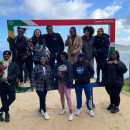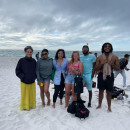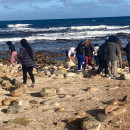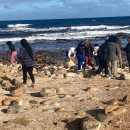Turbulent yet exciting and memorable. July 12, 2023
By A student (Political Science and Government, Middlebury College) - abroad from 07/14/2022 to 06/09/2023 with
IES Abroad: Cape Town - University of Cape Town
I gained friendships and first-hand knowledge of the people and places I read about and discuss in classes and learned how to be more independent and self-reliant. My time abroad was very worthwhile and I am grateful for it.
Review Photos





Personal Information
| How much international exposure did you have prior to this program? | 6 months+ |
Review Your Program
|
* Overall educational experience
Academic rigor, intensity, resources, etc. |
The educational experience was daunting at the beginning of my time abroad because it took time to get used to a new grading system, styles of teaching, and class structure but with enough time you get the hang of it. Expect to get less than a 70 percent for most assignments you do and while this may seem like a problem for someone coming from the states its important to realize this is a common south african grading standard and 70-75 is considered to be above average. |
|
* Host Country Program Administration
On-site administration of your program |
The administration conducted through IES abroad was top notch, with clear communication and staff who were friendly and helpful. On the other hand, the University of Cape Town administration itself left much to be desired. Communication between the University and students was not efficient they would take weeks if not months to respond to important emails to name one pertinent issue. Although the experience with the University was not ideal you have to deal with them less than with IES abroad so its an easily avoidable problem. |
|
* Housing:
How satisfied were you with your living arrangements? |
IES Abroad provides you with two options for housing in two amazing apartment buildings. In the option I chose at Campus Key we were given our own small apartment complete with a bathroom, kitchen(with supplies), a tv etc. In addition to the rooms we were also given room service who would come by on a weekly basis. The only issue with housing is that sometimes it can get incredibly loud, especially on the weekends, due to it being accommodations for mainly issues. |
| * Food: |
For food, you were expected to cook for yourself, but groceries are cheap even when on a student budget. Otherwise, Cape Town has a wide variety of food options to choose from which you can get through uber eats or by going to a restaurant. These range from typical food you'd get in the States, like McDonald's, to food from SA, like Cape Malay food. |
|
* Social & Cultural Integration:
How integrated did you feel with the local culture? |
I felt really integrated especially when i returned for my second semester. I knew the non tourist spots that locals would frequent, I ate like locals went to local events, and after a while i even began adopting slang that my SA friends taught me. Despite this there are times when you definitely felt a lack of integration, especially when discussing certain values and beliefs where you could see some difference in viewpoints as a person coming from abroad. |
|
* Health Care:
How well were health issues addressed during the program? |
IES abroad provides you with insurance for within the country and travel insurance. These comprehensive insurance plans allow you access to the best private facilities in the city. The insurance was likely to cover all expenses and if it didn't the program would work with you to request reimbursement. It's hard to say how the local healthcare system compares to home since at home, I used public hospitals instead of private but from what i've heard the public hospitals in SA are not the best due to having to care for a large number of people at any given time. You are required to get a yellow fever vaccine for the Visa process depending on your country of origin, and IES recommends getting the Malaria vaccination. |
| * Safety: |
On the whole Cape Town is not the safest city, some places are safer than others and some places are worse than others. Crime ranging from pickpocketing to armed robbery is very common and its important to take necessary precautions to keep yourself safe. The only personal incident I've experienced was a homeless person threatening my life, but from friends, there's been stories of them getting their phones stolen and being held up on a night out. While all of this is worrying Cape Town is like any major city when it comes to these issues and if you take the right precautions you will be alright. It's important to travel in a large group when going out a night, don't walk with headphones in or visible this makes you a target, avoid public transport when possible etc. IES abroad gives a class on safety and safety tips during orientation so they will make sure you are prepared but this is some of my best advice. |
| If you could do it all over again would you choose the same program? |
Yes
My time abroad had its ups and downs, the nation of South Africa is faced with many challenges that takes some accustoming to as a exchange student but overall it is an amazing place with even more wonderful people and sceneries. I made some friends that I hope to keep for the rest of my life and I learned my lessons and had many great memories. These are things I wouldn't change for the world and if I could do it all again I would. |
Finances
|
* Money: How easily were you able to live on a student's budget?
(1 = not very easy/$200+ on food & personal expenses/week, 2.5 = $100/week, 5 = very easily/minimal cost) |
The semester budget suggested by the program is good to cover most expenses, including travel, groceries, and going out. If you want to travel around the country or the continent frequently however i would suggest having a much larger budget |
| Not including program expenses, about how much money did you spend on food and other expenses each week? | 100 |
| Do you have any general money-saving tips for future study abroad participants? | Especially in Cape Town, focus on buying groceries and making your own meals instead of eating out and uber eats. The cost of these things may be less when compared to back home but over the course of a semester they will add up. |
Language
| * Did your program have a foreign language component? | No |
Other Program Information
|
* Where did you live?
Select all that apply |
|
|
* Who did you live with?
Select all that apply |
|
|
* Who did you take classes with?
Select all that apply |
|
| About how many local friends did you make that you will likely keep in touch with? |
A Look Back
| * What did you like most about the program? |
|
| * What could be improved? |
|
| * What do you know now that you wish you knew before going on this program? | I wish I knew more about the class and grading structure in South Africa it was different than what I'm used to and was initially difficult to get the hang of. I wish I knew more about the loadshedding situation. |
Reasons For Studying Abroad
| To help future students find programs attended by like-minded individuals, please choose the profile that most closely represents you. |
The Academic or LinguistYou went abroad with specific academic goals in mind; the program credentials and rigor of your coursework abroad were very important to you. You had a great time abroad, but never lost sight of your studies and (if applicable) were diligent with your foreign language study. Good for you! |
Individual Course Reviews
| Course Name/Rating: |
Conflict in World Politics |
| Course Department: | Political Science |
| Instructor: | Helen Scanlon |
| Instruction Language: | English |
| Comments: | The class was not difficult the professor and her tutors laid out all instructions and expectations for the class in a clear manner from the beginning of the semester. Professor Scanlon is very knowledgeable about the topic of conflcit and post-conflict justice as she has worked in this line of work for years, this allowed her to answer all questions we had on the topic in detail and provide relevant and useful background information. Due to the structure of South African classes, I participated less in class unless we were in our tutorials. I want to add that while many SA class structures were not designed for participation, outside of tutorial, professor Scanlon would take the time to answer all of our questions sometimes overhauling the lecture for the day just to focus on our questions. Across the semester we were assessed through two small papers ranging between 1000-1500 pages, a large paper at least 2500 words, 12 weekly blog posts, participation in tutorial, attendance, and finally a two hour long final exam with two sections |
| Credit Transfer Issues: |








